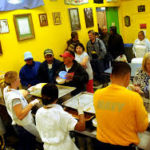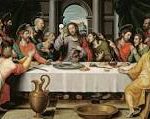A sermon preached at All Saints, San Francisco, on August 28, 2016, by Christopher L. Webber.
Let’s think about food.
The Gospel this morning is only one of many that gets us thinking about food. In fact, it’s a major theme of the Bible: there from beginning to end.
The Bible story begins with food and it ends with food. It begins, actually, with a meal Adam and Eve were not supposed to eat but it ends with an invitation to a feast in heaven. So the movement is in a  good direction, and in between there’s also a lot about food. Take the five books of the law, to begin with. A lot of the law has to do with food: what you can eat and what you can’t eat and how to prepare it. You can’t eat vultures or eels or pigs or bats.
good direction, and in between there’s also a lot about food. Take the five books of the law, to begin with. A lot of the law has to do with food: what you can eat and what you can’t eat and how to prepare it. You can’t eat vultures or eels or pigs or bats.
And then in the New Testament, the Gospel begins with John the Baptist, who had a low carb diet: locusts and wild honey. And how much time did Jesus spend sharing meals – with publicans and sinners, with crowds of thousands, with Mary and Martha, with the disciples at the Last Supper, with the disciples after his resurrection in the upper room, on the lake shore in Galilee, and in the Gospel this morning, with “a leading Pharisee”?
Meals. Jesus shared our lives and our lives are shaped by what we eat – for better or worse. What is more central to your waking hours than food – except for breathing. Well, of course, you may have a job that takes some of your time – lots of people do – but a lot of jobs these days have to do with food: growing it, transporting it, preparing it, serving it. There’s everything from MacDonald’s to the exotic high-end, latest fad elegance. And how many places of work have food available – everything from the machines that dispense snacks to the exotic in-house restaurants of Silicon Valley.
We have to eat. So it’s a necessity, but it’s also a celebration. There’s hardly ever a wedding or  birthday or anniversary or even a funeral without a meal. You can’t celebrate Thanksgiving Day or Christmas without a meal or Easter or probably not the 4th of July.
birthday or anniversary or even a funeral without a meal. You can’t celebrate Thanksgiving Day or Christmas without a meal or Easter or probably not the 4th of July.
I spent a summer years ago as a camp counselor in Connecticut where kids came from the lower east side of Manhattan and I heard about families – hard for me to imagine – that never shared meals. There’d be a pot of something on the stove and you helped yourself when you got hungry. I felt sorry for these poor deprived kids, growing up without that basic experience of being a family. And then I became Rector of a church in a very wealthy community where the men – mosty the men in those days – took the train to Manhattan at 6:49 and got home after 8 and those families too seldom shared meals and it showed. Kids who don’t get attention find ways to get it anyhow. Families who don’t share meals probably don’t share much else either.
So we spend a lot of time with food. I live in the Sunset and I can walk down Irving or Noriega or Ninth Avenue and there’s Chinese, Japanese, Korean, Siamese, Manchurian, Ethiopian – even the inevitable MacDonald’s. There are a dozen restaurants within a very short walk of this church.
Restaurants everywhere; food everywhere. And our problem is that evolution left us well-adapted to deal with famine, but not so much with a MacDonalds on every corner. Our bodies are designed to store up energy in the form of fat and science hasn’t yet discovered a fool-proof way to help us cope with a society that only knows about famine by reading about it somewhere else.
I found reports on-line that show a third of American adults are obese and two-thirds are over weight and the expectation is that those rates will continue to grow. All the concern for fitness and diet is not solving the problem. So let me suggest you look to the Bible for help. Why not? There’s more about eating in the Bible than there is about sin, more about eating than there is about love, and half as much about eating as there is even about God. So why not start with the Bible? And why not start with today’s readings which have a lot to say on the subject if you stop to look.
The Bible does have some answers when we’re thinking about food. And the first advice is to share. “Do not neglect to show hospitality,” says the second reading: “Do not neglect to do good and to share what you have . . .” And the Gospel gives very specific, practical advice: “When you give a luncheon or a dinner, do not invite your friends or your brothers or your relatives or rich neighbors, in case they may invite you in return, and you would be repaid. But when you give a banquet, invite the poor, the crippled, the lame, and the blind.” And don’t tell me you don’t know anyone who is poor, crippled, lame, or blind. We see them every night on the news, and some of them not that far away.
Some of you, I know, help with a soup kitchen. There are dozens of food pantries and soup kitchen in San Francisco – and it isn’t enough because at bottom we’re facing a problem we don’t know how to solve because we’re dealing with people and we don’t know how to “fix” people. People are people;  not machines. If we’re looking for solutions, solving problems, we may be doing it wrong. Even in marital relationships, you know, we can’t fix the other person – they’re going to be who they’re goinmg to be – but we can love them. And that’s all we’re commanded to do. And love is expressed by sharing.
not machines. If we’re looking for solutions, solving problems, we may be doing it wrong. Even in marital relationships, you know, we can’t fix the other person – they’re going to be who they’re goinmg to be – but we can love them. And that’s all we’re commanded to do. And love is expressed by sharing.
One reason, you know, that Americans are eating too much is that we don’t share enough what we have. And not just with people elsewhere. More children in this country live in poverty than in any other developed country – one out of every five and up to a third in the District of Columbia. Can you believe it? In Washington D.C. a third of the children live in poverty.
Franklin Roosevelt in his second inaugural address said, “I see one third of a nation ill-housed, ill-clothed, ill-fed.” Eighty years later our representatives can look out their windows and see it now. A third of the children in Washington ill housed, ill clothed, ill fed. In this country, the last survey I saw by the U.S. Department of Agriculture said that nearly 32 million Americans live in homes at risk of hunger, 15.3 million children lived in food-insecure households in 2014. 20% are ineligible for government assistance because we tightened up the welfare rules and children suffer. But world-wide, millions of children die of malnutrition every year. That figure is sometimes publicized as saying that so many children die of hunger every few seconds – but that’s not exactly right. It’s not starvation but malnutrition that’s the deadly enemy. Mal-nourished children die of all sorts of things. And it’s not necessary. There’s food enough for all. It’s just not in the right places. You might say that Americans also are dying of malnutrition – but for many of us it’s too much, not too little.
There was a time when they thought that the world couldn’t feed any more people, but since then the world population has doubled and tripled, and the rich nations have more than is good for us and there is more than enough for all – if it’s shared. Forty-two years ago, in 1974, world leaders at a  World Food Summit committed themselves to end hunger in ten years. That was forty-two years ago. It was agreed that the means were available; only the will was lacking. So, in 1996, 22 years later and twenty years ago, world leaders committed themselves to cutting hunger in half in twenty years – they would do half as much in twice as long and time is up. Did you ever have children in the back seat asking “Are we there yet?” Well, we’re not. Not there. No. A long way from it.
World Food Summit committed themselves to end hunger in ten years. That was forty-two years ago. It was agreed that the means were available; only the will was lacking. So, in 1996, 22 years later and twenty years ago, world leaders committed themselves to cutting hunger in half in twenty years – they would do half as much in twice as long and time is up. Did you ever have children in the back seat asking “Are we there yet?” Well, we’re not. Not there. No. A long way from it.
But why should our leaders push when we followers don’t care? Have you ever written your Congressional representatives on the subject? Have you asked what the candidates this year plan to do on the subject? Have you looked at web sites for the two parties to see what they say about food and hunger – or don’t say? I could go into detail – but I think it’s enough to say that one document has a lot to say on the subject and the other says nothing at all. But then I looked up our member of Congress and her web site highlights seventeen issues she’s concerned about. Food isn’t on the list.
The point is simple: where there is enough food for everyone and some have too much and some are starving, the obvious thing to do is share: contribute to the Episcopal Relief and Development Fund or any other, take part in a Crop Walk or sponsor someone in it, vote for candidates who understand the issue – if you can find one. And cut back on your own food intake so you can share more. Some people set an extra place at the table and put something into a box or jar at each meal to contribute. That’s one way of inviting the poor and hungry to your table; one very simple and practical way of sharing what we have. Episcopal Relief and Development is also a good way to go. Look it up on line. They’re into fixing the problem: Providing chickens, not egg salad; seed and fertilizer, not sandwiches. Solutions, not bandages. And it starts with sharing.
Sharing does two things: it helps keep us from over-eating and it keeps others from dying. Jesus provides the solution in today’s gospel. The program has been in place for 2000 years. But sharing is more than just feeding others. Sharing is also about our own lives. Sharing food brings us together in all sorts of ways: as a family, as a congregation. It’s no coincidence that what we do here on Sunday is to share a meal. It’s what Jesus did so often with his disciples; not just at the Last Supper. And it’s not just about bringing us together with each other; it’s about uniting our lives with those of our Risen Lord. It’s Jesus’ life we share in this meal, his life that renews and strengthens ours.
I served for a number of years in churches that always brought food to the altar at the Offertory, not just bread and wine but food to share with others, cans and boxes for the nearest food pantry. They set the basket down in front of the altar and took it off the next day to a food pantry. It made an important point: this meal – what we are doing here this morning – is about sharing.
And maybe it’s also worth noticing that the food we share here comes in very small portions. When I go out to eat with family we almost always come home with enough for another meal. But not here. Here, one small piece of bread, one sip of wine, is food enough to renew us and strengthen us. That probably won’t do for your evening meal but it is, I think, a reminder that we don’t need to stuff ourselves to have enough. This simple sharing unites us and renews us and there’s more than enough for all. Compare serving sizes here and at your favorite restaurant and your own table and think about it. What does that tell us? How much do we really need? In the second reading we are told to show hospitality to strangers. Share with others. In the Gospel, Jesus tells us what to do: “When you give a banquet, invite the poor . . .” If we can’t do it in practice, we can certainly do it symbolically and practically and this central act of worship provides the example.
Here’s a table where all are welcome. So what is it all about? It’s about unity, first of all: It’s about unity. It’s about sharing our lives with others. It’s about God sharing life with us. It’s about coming together at every level. Second, it’s about renewal. We eat to live, we eat to renew our strength. But we need more than vitamins and minerals. Jesus said, “We do not live by bread alone but by the word of God.” And the word is made flesh and the word is made bread. So here, as in every meal, we are renewed inwardly and outwardly. Did you ever learn the catechism definition of a sacrament: “an outward and visible sign of an inward and spiritual gift.”
One of the great tragedies of Christian history is that this meal was so misunderstood that some churches gave it up almost entirely. Still today there are churches where it is seldom provided. But we need more than sermons and hymns; just as we need more from our parents than good advice. We need to share food. We need the Eucharist. We need it for unity, we need it for renewal, and we need it for joy.
Joy: my last point. The prophets and the Book of Revelation both describe heaven as the sharing of a great feast. How could it not be? It’s the joy of coming home at last, the joy of being loved completely and powerfully, the joy of being united with God and all God’s saints. It’s the joy of victory. And what we do today is a foretaste of all that, a reminder of what will be and what could be now if we only learn to do better such a simple, instinctive thing: share. Share what we have with others who are still in need. Share our food. Share this meal. Share the love of God. Share the joy.